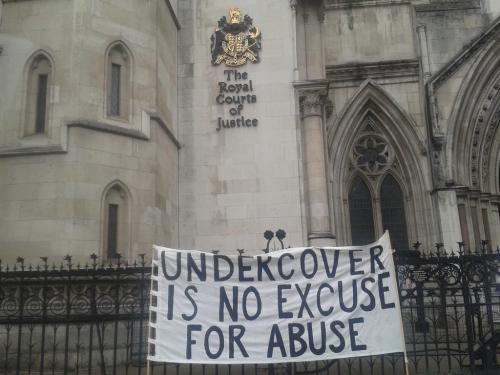
Statement by the eight women:
In the apology issued today by assistant commissioner Martin Hewitt, the Metropolitan Police finally conceded that 'officers, acting undercover whilst seeking to infiltrate protest groups, entered into long-term intimate sexual relationships with women which were abusive, deceitful, manipulative and wrong' and that 'these relationships were a violation of the women’s human rights, an abuse of police power and caused significant trauma'
AC Hewitt issued this public apology on behalf of the Metropolitan Police as part of the settlement of seven out of our eight claims arising from intimate relationships we were decieved into by undercover police officers Bob Lambert, John Dines, Mark Jenner, Jim Boyling (all Special Demonstration Squad officers) and Mark Kennedy (of the National Public Order Intelligence Unit), all of whom infiltrated environmental and social justice campaigns.
The apology is the result of our four-year legal battle to bring to public attention these state sponsored, deceptive relationships and to prevent future abuses. We have worked together on this painful and deeply personal legal case in order to expose the serious and systemic abuse of power by undercover police officers and their managers. Although no amount of 'sorry', or financial compensation, can make up for what we and others have endured, we are pleased the police have been forced to acknowledge the abusive nature of these relationships and that they should never happen.
Our relationships, spanning a period of nearly 25 years, had remained hidden until we exposed them through a series of media reports starting late in 2010. By linking our cases together we have been able to evidence a clear pattern of abusive, discriminatory behaviour towards women which amounts to institutional sexism by the Metropolitan Police.
Five years ago it would have seemed inconceivable to the public that state employees would go to such lengths, but the scale of the abuse uncovered demonstrates that this was accepted practice for many years. Other cases arising from intimate relationships are still ongoing and we are aware of more relationships yet to be publicly exposed.
While the UK purports to be a democratic country, the level of deception perpetrated by state agents seeking to undermine movements for social change is more akin to that of the Stasi in East Germany. These professionally supported relationships – some of which bore children – lasted as long as nine years and have remained hidden from the public for decades. Indeed, the police still refuse to publicly acknowledge the harm caused to the children born of and into these relationships or even bring themselves to refer to them in their apology today.
One of the key reasons we brought the case was to ensure that such relationships would not happen again. As part of the settlement, the Metropolitan Police acknowledged that ‘sexual relationships between undercover police officers and members of the public should not happen’, that ‘these cases demonstrate that there have been failures of supervision and management’ and they recognised ‘that this should never happen again and the necessary steps must be taken to ensure that it does not.’ The police also recognise that ‘these relationships, the subsequent trauma and the secrecy around them left these women at risk of further abuse and deception by these officers after the deployment had ended.’
Alongside this comprehensive apology, the Metropolitan Police made substantial financial settlements to seven of us, meaning we are unable to take this matter forward to open court. However, one of us is able to continue her case and the rest of us will support her and continue the fight to obtain disclosure, and to have the legal framework governing undercover policing examined by the courts.
The apology from the Metropolitan Police is a clear admission of responsibility for what happened to us, and we will now be working hard together and with others to ensure that the public inquiry into undercover policing is robust and transparent. Secret political policing undermines social progress for justice and equality and should have no place in our society.

